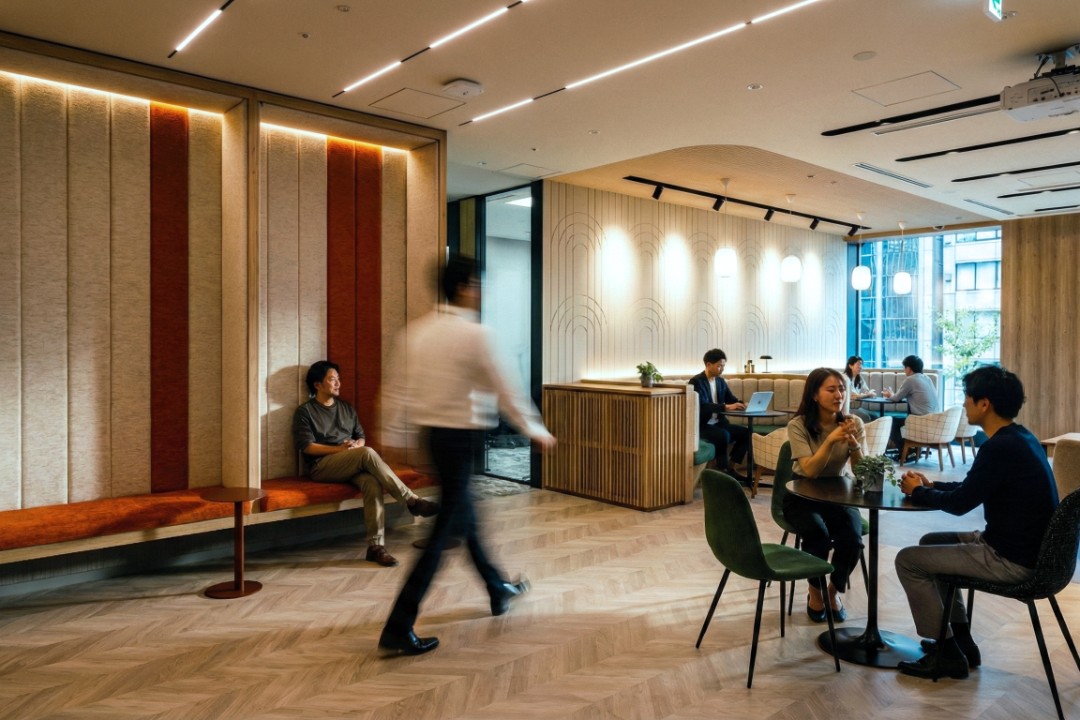What is the difference between flexible workspaces and coworking spaces?

Workplaces today are a far cry from what they were a few decades ago, when traditional offices with fixed desks, cubicles, and long-term contracts were the standard. Modern companies now prefer alternative solutions that give them flexibility, cost savings, and scalability so they can adapt quickly to dynamic markets. Enter flexible workspaces and coworking spaces — providers that offer short-term rental plans and shared office amenities for startups and next-generation businesses.
People often use the terms ‘flexible workspaces’ and ‘coworking spaces’ interchangeably because these locations provide on-demand work solutions without long-term commitments. But they differ when it comes to the privacy, lease terms, and community engagement they offer clients, making them suitable for different types of companies. This makes it important for companies and startup founders to understand these distinctions so they can choose an office environment that best supports their growth and productivity.
Why are Flexible Workspaces and Coworking Spaces Becoming Popular?
The first type of non-conventional office was the coworking space, though precursors of today’s flexible work premises like short-term office rentals and hot desking existed before the concept became popular. However, ever since the Covid-19 pandemic, there’s been a greater demand for these options thanks to the rise of remote work and hybrid models, which see employees splitting their time between working from home, regular offices, and flexible spaces.
Many companies now prefer more dynamic and cost-effective choices like flexible workspaces and coworking spaces over traditional, long-term leases. Another benefit is their modern workspace design with open-plan layouts that encourage interaction and idea-sharing, in turn leading to productivity and collaboration. This trend is expected to become more mainstream as companies look for office spaces that allow for agility, affordability, and employee well-being.
What is a Flexible Workspace?
A flexible workspace — also known as a flex office or flexi space — gives employees greater control over their location, schedule, and work style without getting into the nitty-gritty of office management. It allows businesses to change things up based on their needs so they don’t get locked into rigid long-term lease contracts. Plans include access to non-assigned desks (hot desking), more exclusive private offices, and serviced offices with fully managed conveniences like reception services, IT support, and meeting rooms.
These types of environments are often favoured by corporate teams, project-based employees, and hybrid workers. They work best for businesses that require both private and shared spaces, don’t want the hassle of setting up furniture and equipment, and need leeway to adjust office size and layout. Many providers also allow customisable office layouts to reflect company culture and workflow preferences. Businesses also gain access to fully equipped meeting rooms, high-speed internet, and administrative support.
What is a Coworking Space?
A coworking space is a shared, flexible workspace where professionals from different companies or independent workers operate in a communal setting. They typically have shared desks and an open-plan layout, and come with perks like coffee lounges, networking events, and community-driven activities that contribute to a social and interactive atmosphere. These services work on a membership-based system, allowing users to select daily, weekly, or monthly plans depending on their needs. Facilities include high-speed internet, meeting rooms and work pods, and dedicated desks or hot desks.
These environments appeal to professionals who thrive on collaboration and idea exchange. Freelancers, solopreneurs, and digital nomads also prefer coworking spaces because they provide affordable, sophisticated work environments without the isolation that comes with working from home. Startups also use coworking spaces as a cost-efficient way to work in prime locations and, in the bargain, get networking opportunities.
Key Differences Between Flexible Workspaces and Coworking Spaces
While both flexible workspaces and coworking environments are more versatile than their conventional counterparts, they aren’t exactly the same when it comes to privacy, lease terms, and relationship-building prospects. It’s crucial to be aware of the differences between these work models before zeroing in on one.
Privacy and Structure
Flexible workspaces are more suited to businesses that require confidentiality as they come with private offices, dedicated rooms, and confidential meeting spaces. Some offices even provide keycards, biometric entry, and secured workstations to reduce security risks. On the other hand, open collaboration is the very essence of coworking spaces, which is great for team-centric tasks, but distracting for those that need focus and discretion. Sensitive information may also be at risk in open environments like the shared areas and communal workspaces in coworking spaces.
Lease Terms and Scalability
Flexible workspaces generally have adaptable contracts to give clients the chance to adjust their space as they grow or scale down, making them appealing to enterprises and startups. In contrast, coworking spaces operate on fixed memberships, so they work better for freelancers and remote workers who want budget-friendly options without having to sign a long-term agreement.
Community and Networking
Coworking spaces are based on community engagement, offering opportunities for networking, collaboration, and knowledge sharing. Many host workshops, events, and business meetups to connect professionals working in different companies and industries. But flexible workspaces are more structured and don’t place as much emphasis on social engagement. However, some coworking spaces do offer private office options, creating a sort of hybrid environment that balances collaboration and privacy.
Cost Considerations: Which is More Budget-Friendly?
The cost of a workspace varies based on factors like location, facilities, and business needs. Broadly speaking, coworking spaces operate on subscription-based billing, so users pay monthly or daily fees for access. In contrast, flexible workspaces offer tailored lease agreements, allowing businesses to pay only for the space they use.
Prices can also vary based on whether companies choose hot desks, dedicated desks, or private offices. Hot desks are the most affordable option, making them more apt for freelancers and remote workers. Dedicated desks provide reserved spaces with personal storage for workers who want a fixed workstation on budget-friendly terms. Private offices in flexible workspaces are priciest options and cater to businesses that require confidentiality and branding opportunities.
Then there’s the matter of location. Both models give clients and members global access and others place location- or region-based limits on the use of their international spaces. If you’re a digital nomad, you may want to spring for multi-location access, depending on where your travels take you.
How Do Flexible Workspaces and Coworking Spaces Fit Into Hybrid Work?
Many businesses now want to incorporate hybrid models into their way of working. One way is to use flexible workspaces to set up regional or satellite offices. This allows employees to work closer to home in a professional environment. Coworking premises also offer hybrid teams and remote team members on-demand work setups so they don’t need to commit to permanent office space.
Then there are companies who opt to mix coworking memberships with private office rentals so that teams can use common areas when they need to work together and private workspaces for more confidential tasks. Some providers even integrate smart office solutions — think automated booking systems and hybrid work management tools — to help businesses streamline operations and boost team collaboration across several locations.
Getting an insight into the differences between flexible workspaces and coworking spaces is vital for companies and startups on the lookout for the right office solution. While coworking spaces offer affordability and networking prospects, flexible workspaces provide privacy and scalability for growing businesses. The best choice depends on a company’s budget, culture, and operational needs.
Ready to Choose the Right Workspace for Your Business?
Whether you’re a company seeking flexibility and privacy or a startup looking to expand your network, we’re here to provide expert guidance in finding the perfect flexible workspace or coworking space for your needs. Contact us today to let our dedicated team help you evaluate options, compare solutions, and ensure your office environment supports business growth and employee well-being. Don’t let indecision hold you back—take action now!


